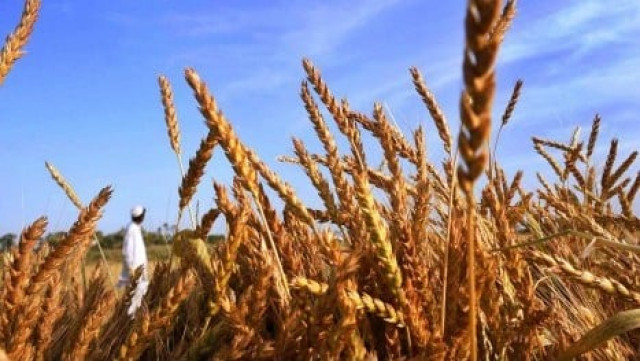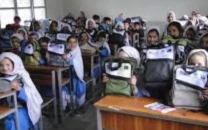Govt moves to reduce wheat, sugar prices
Faraz accuses past govts of paralysing institutions; vows to break back of cartels

The government is taking several steps to reduce the prices of items of daily use, particularly wheat flour and sugar, and planning “targeted subsidy” to provide relief to the deserving persons, Information Minister Senator Shibli Faraz said on Wednesday.
Addressing a press conference after a review meeting on inflation and prices of daily use items, chaired by Prime Minister Imran Khan, the minister accused the past governments of making policies for personal gain and elite class, leading to weakening of the state institutions.
“The government is taking all possible steps to reduce the prices of flour, sugar and other items of daily use,” Faraz told the press conference. “The government will reduce the prices of essential goods at any cost,” he added.
“The focus of the prime minister's policies is the welfare of the poor and backward classes, who are directly affected by hike in the prices of daily-use items, whereas the past rulers made policies for personal gain and elite class,” he said.
According to the information minister, the prime minister was regularly getting briefings on inflation and prices, and he had been issuing directives to the provincial governments for taking steps for their effective control.
Wheat flour
The minister pointed out that the sugar and flour cartels were influential but hey would “not be given any concessions at the cost of consumers but they are not powerful than the people and the government”.
Faraz told reporters that the meeting was informed that a 20-kg flour bag was being sold at Rs900-1,150 in Khyber Pakhtunkhwa and Rs860-950 in Punjab but in Karachi the rate was Rs1,700. “The reason for the high price of flour in Sindh is that the provincial government has not issued wheat quota to the flour mills,” he said.
According to the minister government planned more or less the same price of flour in all the provinces. “Adviser to Prime Minister on Finance Hafeez Sheikh, Punjab Food Minister Aleem Khan and the food secretaries are working on a plan of action [in this regard],” he said.
Sugar
Faraz said that the objective of importing wheat and sugar was to improve their supplies to reduce their prices. The first consignment of imported wheat would arrive on August 24, he said. “Both public and private sectors are importing sugar to reduce its prices in the market,” he added.
The government sought to reduce the sugar price by at least Rs20-25 per kilogram, the minister said, adding that the government was keeping a close eye on the sugar hoarders and they would be taken to task. “There are indications that some people are hoarding sugar in Karachi,” he added.
Replying to a question about the sugar crisis, the minister said that related institutions were being investigated. He added that after the report of the sugar inquiry commission, the sugar prices increased to put pressure on the government, but it would not bow to any pressure from the cartel.
“Since the past rulers owned sugar mills so they formulated policies for their own interest at the cost of farmers and consumers,” he said. “There is no doubt that the institutions, and not the individuals, run the country, but in the past, the institutions were paralysed, degraded and made dysfunctional,” he added.
“Mafias are very strong and have a great clout to use the institutions for their own benefit,” he said. Unlike other provinces, he continued, the relics of the past still prevailed in Sindh, which would hopefully be “erased by the people in the next elections”.
“The back of the hoarders and profiteers will have to be broken to provide cheap flour and sugar to the people,” he said. “It is the prime concern of the prime minister, he expressed his dissatisfaction over the prevailing rates, though some of them had come down in recent days.”
The minister told reporters that the government, in collaboration with the provincial governments, planned to introduce a new law to ensure timely start of the sugarcane crushing. Under the new law, if a sugar mill delayed crushing, a fine of Rs5 million per day would be imposed. At present, he said, the fine was Rs20,000 for the entire season.
Coronavirus pandemic
Faraz said that it was a matter of satisfaction that during the difficult times of coronavirus pandemic, the supply of daily-use items remained stable. “The pandemic was a global issue but unfortunately, the Sindh government played politics on the issue despite the fact all the decisions to deal with the pandemic were made with consensus.
Responding to another question about subsidies to the Utility Stores Corporation (USC), the minister contended that the Punjab government was providing Rs6 billion subsidies per month and everyone, the rich or the poor, was benefiting from the relief. However, he added that by utilising the Ehsaas Programme data, targeted subsidy would be given only to provide relief to the deserving persons.
With input from APP



















COMMENTS
Comments are moderated and generally will be posted if they are on-topic and not abusive.
For more information, please see our Comments FAQ